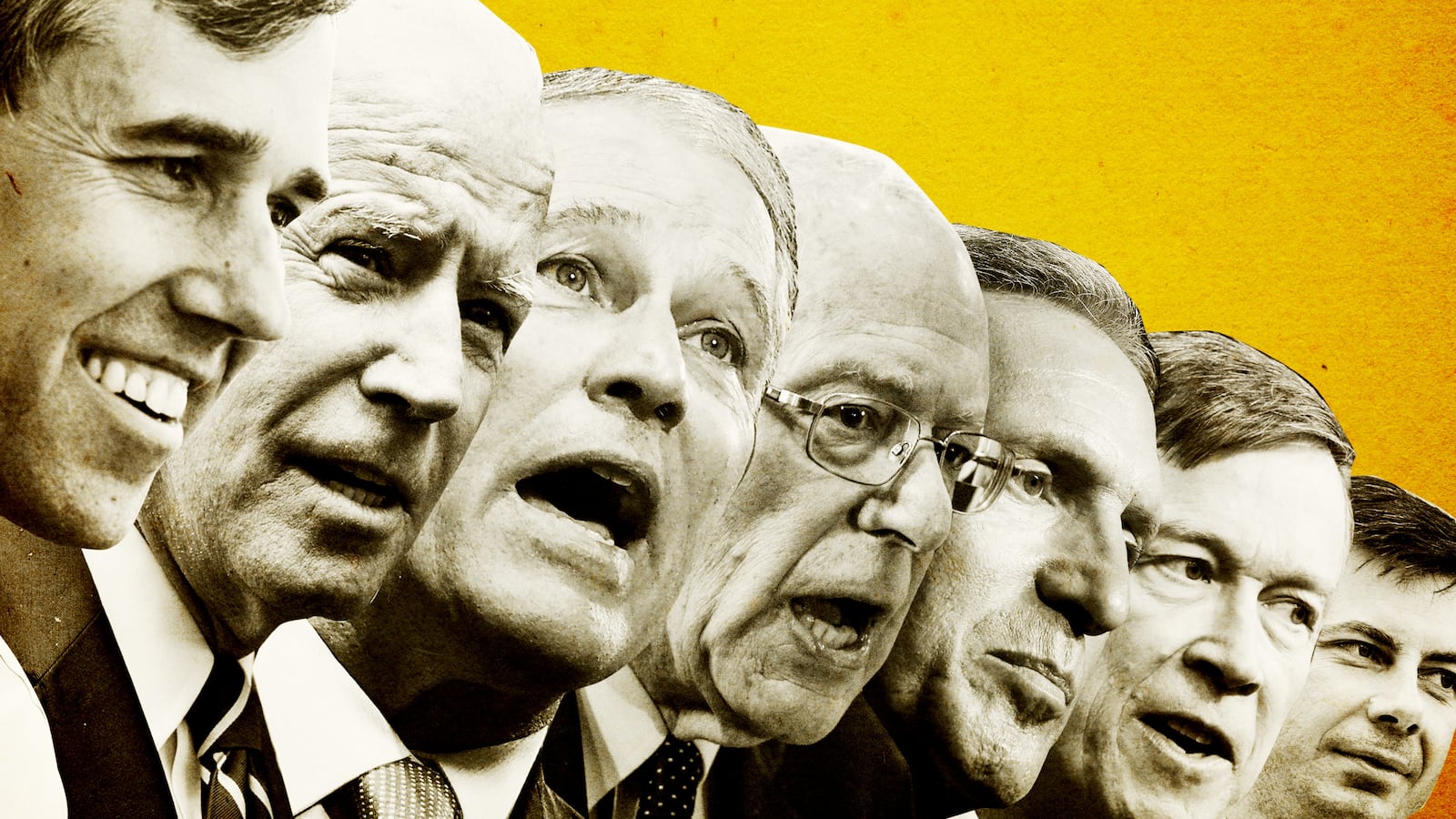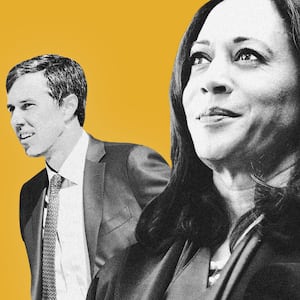The Democratic Party’s field of presidential contenders might be the largest and most diverse in history, but that new phenomenon hasn’t foreclosed a much older one: white men asking, why shouldn’t I be president, too?
The result has been a heavily white, decidedly XY chromosomal surge among those entering or thinking of entering the 2020 primary. After a series of high-profile women and people of color jumped into the contest, almost half a dozen Democrats, all of them white men, have either announced bids of their own or begun inching toward making a run.
Former Vice President Joe Biden, New York City Mayor Bill de Blasio, former Virginia Gov. Terry McAuliffe, Sen. Michael Bennet (D-CO), and Rep. Seth Moulton (D-MA) have all visited key early states and are probably on the brink of kicking off their campaigns. The two newest candidates in the race, meanwhile, are white men with modest records in Congress: Rep. Eric Swalwell (D-CA) and Rep. Tim Ryan (D-OH).
These bids have renewed sensitive questions from both observers and rival campaigns about pre-existing power structures and how voters, the media and even Democrats themselves judge issues of electability in the age of the self-identified über white male: Donald Trump. Mostly, however, it has left people wondering what it will possibly take to break up the patriarchy that is presidential politics.
“We have 250 plus years of history in this country of white guys looking in their mirrors and seeing a future president,” Stephanie Cutter, former deputy campaign manager for President Obama’s 2012 reelection campaign, told The Daily Beast. “We are starting to see a generational shift with more diverse people building the right experience and national support to be president. But, as you can see by the recent coverage of this race, we still have a lot of work to do.”
With roughly 300 days to go before the primary voting begins, no one is quite certain how Democratic voters will value ideological purity or experience when making their decisions. Less clear is the degree to which diversity itself will come to define the party. In addition to the wave of new entrants into the primary, public opinion polls currently place two septuagenarian white former presidential candidates—former Vice President Joe Biden and Sen. Bernie Sanders (I-VT)—in the lead.
Even the news coverage of the race has drawn criticism for the way it has prioritized and described the men in the race (as this piece may well too, being written, as it is, by two white male journalists). A recent analysis by Northeastern University’s School of Journalism found that the percentage of positive words being used to describe female candidates was lower than for male candidates. Others have also found that a number of male candidates have completely dominated recent news cycles.
It is, at times, a more complicated image than critics suggest, since a large share of recent coverage of Biden was centered around testimonials of women feeling uncomfortable in his presence. But it’s been enough to lead some Democrats to wonder whether the lessons of 2018—in which a historic number of women candidates won federal office—have been forgotten in a matter of months.
“With the record wins for women and minority candidates, Democrats in 2018 showed they were pretty sick of having white guys in Congress, so I’m not sure what makes these dudes think the White House will be different,” an aide working for a current Democratic campaign told The Daily Beast. “They’re much more the Rick Santorum model than Barack Obama: run for president to get famous, become known, and stop getting buried in obscurity as a House backbencher. They understand our media environment won’t really punish them for giving it a go, but they will not be the Democratic nominee, and if they were being honest they’d tell you they know that, too.”
For those white men actually running, questions of race and gender have proven tricky. Swalwell, a fourth-term congressman from the Bay Area and a familiar presence on cable news, defended his right to jump into the race as he hopped in a car to address a union event on Wednesday. “I don’t think anyone’s identity should keep them from running,” he said. “But I think you better see all the other identities out there."
O’Rourke, meanwhile, has spoken candidly about the privilege afforded to him because of his race and gender. But the fact that he was immediately heralded as a potential 2020 contender even while former Florida Democratic gubernatorial candidate Andrew Gillum and former Georgia Democratic gubernatorial candidate Stacey Abrams were left out of the 2020 conversation, has stirred immense frustration among others in the party.
“I think it’s frankly a travesty that folks have rushed to elevate Beto O’Rourke,” Symone Sanders, who served as national press secretary for Sen. Bernie Sanders’ (I-VT) campaign in 2016, told The Daily Beast. “I wanted Beto to beat Ted Cruz just like every other good Democrat, but I don’t think that there was anything inherently special about him that made him better or different than Stacey Abrams or Andrew Gillum.”
Sanders, who is not working for any campaign currently, was not dismissive of any candidates jumping into the race who believed that they had something to offer voters. She just stressed that they needed to be aware of the challenges for minorities in the field.
“When it comes to the highest level of politics, whether we want to believe it or not, there’s still an asterisk by people of color,” she said. “There’s still an asterisk by women. There’s still an asterisk by people in the LGBTQ community.”
In an attempt to thwart criticism that they’re not bringing anything new to the field beyond the stature of the office they hold, some white male hopefuls have already begun to outline specific themes for their candidacies.
Bennet, who recently received a prostate cancer diagnosis, has signalled a run based on bipartisan efforts to fix the health care system. Swalwell is planning to put gun control at the center of his bid and hopes to leverage his age—he’s 38—to brand himself, in his words, as a “generational” candidate.
Moulton, a three-term congressman best known in Washington for his failed attempts to oust Nancy Pelosi as the Democratic leader, wants to be the national security candidate. “I’m the only person running or considering running who’s even talking about national security,” said Moulton, who is a decorated Iraq War veteran. And Ryan, who represents a blue-collar district in northeast Ohio and is also best known for trying to unseat Pelosi, is explicitly casting himself as the Democrats’ best candidate to win back working-class white voters who fled to Trump.
These Democratic longshots don’t believe their identities pose a serious obstacle to getting traction in this historically diverse field. “I don’t think that identity politics should keep anybody in or out of the race,” said Moulton. “It’s all about how you can best serve the country.”
And, for the most part, their Democratic colleagues believe they’re right to be imbued with a sense of confidence in their mission. After all, the American presidency is fundamentally a story of white men realizing their dreams of grandeur. As one Democratic lawmaker of color put it: “I mean, look at Trump.”
—Sam Stein contributed reporting








